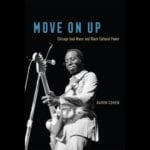Chicago Troubadour Mark Dvorak Plans Full Slate of Recordings
Mark Dvorak acknowledges his plans are a bit ambitious as he rattles off a laundry list of projects on tap over the next year and a half.
“The first one is It’s a Sin to Tell a Lie, which is a collection of old pop standards,” the Chicago-based folk troubadour says by telephone from his home in Riverside, Ill. “The second album I want to record is all banjo music. Then I want to do an audio version of my book of essays and poems, and another disc of 10-12 original songs.”
Instead of feeling overwhelmed by the task, however, Dvorak is exhilarated at the thought of each project. Time Ain’t Got Nothin’ On Me, his latest album, was released in 2011, but since then “Chicago’s official troubadour” has continued to teach at Chicago’s Old Town School of Folk Music; written “Bowling for Christmas & Other Tales From The Road,” a collection of 21 essays and three poems published in 2013; and kept up a busy road schedule.
“I’ve got some new songs I’m looking forward to trotting out,” Dvorak says. “There’s a brand-new song called ‘Old Friends.’ It’s kind of a country-sounding song, which has something do with my friends in Tennessee.”
Another new tune, “Pueblo, Colorado,” is among a handful of songs on Back Home, which Dvorak describes as a “sampler of all the stuff I have planned for this year.”
“I wrote that song on my way to Colorado,” Dvorak says. “I stopped at this truck stop to get breakfast and sat at the counter. There was this young man who had been in the military whose name was Matt. He was looking for a new start and was heading to Pueblo. He told me his story.”
Dvorak’s own story begins on Chicago’s southwest side where as the third son of four, born to a working-class family, music became an outlet.
“I had two brothers who played so there were guitars around the house,” Dvorak says. “For a young person at that time I think the guitar represented something. When I went to the Old Town School of Folk Music for some classes I just loved the vibe of the place. It was easy to be there and a healthy curiosity turned into an avocation.”
That led Dvorak to the recordings of Woody Guthrie, Lead Belly and Pete Seeger. In 1981, he performed at the Fox Valley Folk Festival in Geneva, Ill., for the first time, and a year later borrowed a five-string banjo and began teaching himself how to play. In 1986 Dvorak joined the faculty of the Old Town School of Folk Music, and became embedded in the Chicago acoustic scene.
“The Old Town School sort of gave me permission just to enjoy music and learn about it without having to get on the path many of my friends did, grinding it out at clubs and trying to audition and get an agent to get some attention,” Dvorak says. “I still love music and the guitar and the sound of the banjo, and the Old Town School represents that to me.”
One of the musicians who continues to inspire Dvorak’s music is Huddie Ledbetter, the folk and blues musician better known by the name Lead Belly. In the summer of 1990, Dvorak headed to Louisiana in search of the singer’s grave.
“That was the year I bought my first car that didn’t have 200,000 miles already on it,” Dvorak says, laughing. “It was a used Ford that had only 10,000 miles on it. One of the places I always wanted to go was Louisiana to try to find Lead Belly’s grave.”
Dvorak not only found the marker, but walked the streets of Shreveport finding touchstones such as the old church at the end of a street that Lead Belly referenced in his songs. Dvorak kept a travelogue of his journey, and when he returned showed it to a friend.
“That friend happens to be the news director at WDCD radio in Glen Ellyn, Ill., and host of the folk music program,” Dvorak says. “He suggested doing it as an audio documentary.”
That documentary, called “Lead Belly’s Legacy,” aired on public radio stations in 160 cities, and earned Dvorak the Peter Lisagor Award for journalism in 1993. Since then, Dvorak has released Old Songs & New People (1995), The Streets of Old Chicago (1998), WeaverMania! LIVE, (2000), Every Step of the Way (2005), What a Wonderful World (2008) and Time Ain’t Got Nothin’ on Me (2011), which peaked at No. 14 on the Folk DJ chart.
In December 2013, Dvorak published his first collection of essays and poems, “Bowling for Christmas and Other Tales from the Road.” The book sold out of its initial printing in nine days.
“I’ve always worked at writing,” Dvorak says. “When I have an idea, I always try to capture it on paper. After my dad died in 2004 you get a reminder of how temporary all of this is, and I went through my notebooks and took things that were rough drafts and put them up on my website and people would read them. The idea for this book emerged from that.”
As for all of those future projects? Dvorak seems resolved to get them done.
“The more you play, the more you realize that some melodies are timeless,” he says. “When you have that and the lyrics are so well written, it’s fun to work on arrangements of those types of songs. I’ve always loved music because these people seemed to know something and I wanted in. I was drawn to it, and knowing a lot of songs seemed to be the way to do that. It seemed like a road waiting to be walked down. I guess I’m still walking it.”
A version of this article originally appeared in The Herald-Palladium newspaper of Saint Joseph, Mich..




